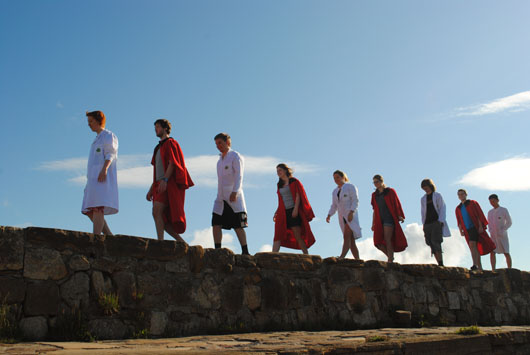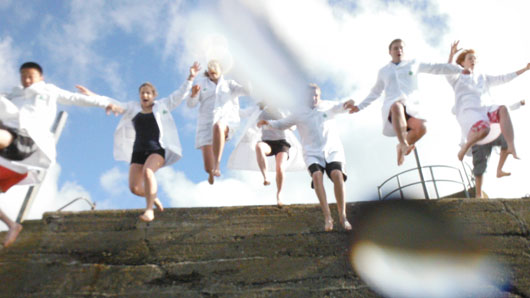Streets of London: paved with platinum?

A method of retrieving platinum from city streets and the production of omega-3 from E. coli are the exciting projects St Andrews’ students have entered into an international contest.
The work of University of St Andrews’ undergraduates Zoe Ashwood, 19, and Michael Lockhart, 22, will be featured in the European leg of the international Genetically Engineered Machine, iGEM, competition. Following an intensive ten weeks of research, the pair are currently putting the final touches to their work, which will be presented in Amsterdam in early October.
Michael Lockhart, from Manchester, who is entering his final year of an integrated masters in medicinal chemistry, is working with metal-binding proteins in order to recover the platinum and palladium particles discarded by the catalytic converters in cars.
He is confident of developing a method which would reclaim the precious particles so they could be recycled and reused in new catalytic converters or for a multitude of other purposes.
He quoted Angela Murray, a PhD student from the University of Birmingham, and pioneer of the manual retrieval of metal from road dust, who said: “If a road sweeper went along a city street 3km long for a year we could produce 30g of platinum. This would be enough to make into a ring that might sell for £2,500″.
Michael said: “In addition to collecting this precious metal, this process will make this green technology even more environmentally sustainable.”
Zoe, from Falkirk, who has just finished the third year of a degree in physics and maths seeks to use maths to achieve the team’s other laboratory-based project. As well as producing the metal binding proteins, Team St Andrews are keen to artificially produce omega 3, using E. coli as a host.
She said: “The predictions from our mathematical models are clear. In light of depleting stocks of fish in our seas, a synthetic way of creating this essential dietary supplement is likely to be crucial in the not-so-distant future.”
Although not their primary aim, the team are also investigating the economics associated with their projects and the possibility of making their techniques commercially viable.
The teams consists of nine students, two PhD advisors and five academic staff, from the Schools of Biology, Chemistry, Computer Science, Medicine and Physics and Astronomy, all hope to make it to the grand finals at MIT, Boston, in November.
Synthetic biology is the discipline of manipulating cells in order to create BioBricks and combining them in a form of biological engineering. Resulting cell factories can then produce useful products.
St Andrews have been successful in the past two years in the competition.
Zoe said: “Synthetic biology is a very exciting discipline; I cannot believe what is now possible both within and outwith the laboratory. We are keen to tell as many people as possible about this fast growing area of science; how it will shape lives and perhaps even alter the meaning of the term ‘life’.”
ENDS

Note to Editors
For images contact the press office.
Michael Lockhart is available on 07983 556316 and by email: [email protected].
Issued by the Press Office, University of St Andrews
Contact Fiona MacLeod on 01334 462108 / 0771 414 0559.
Ref: (synthetic 25/07/11)
View the University’s latest news at http://www.st-andrews.ac.uk/news/
Category Student experience